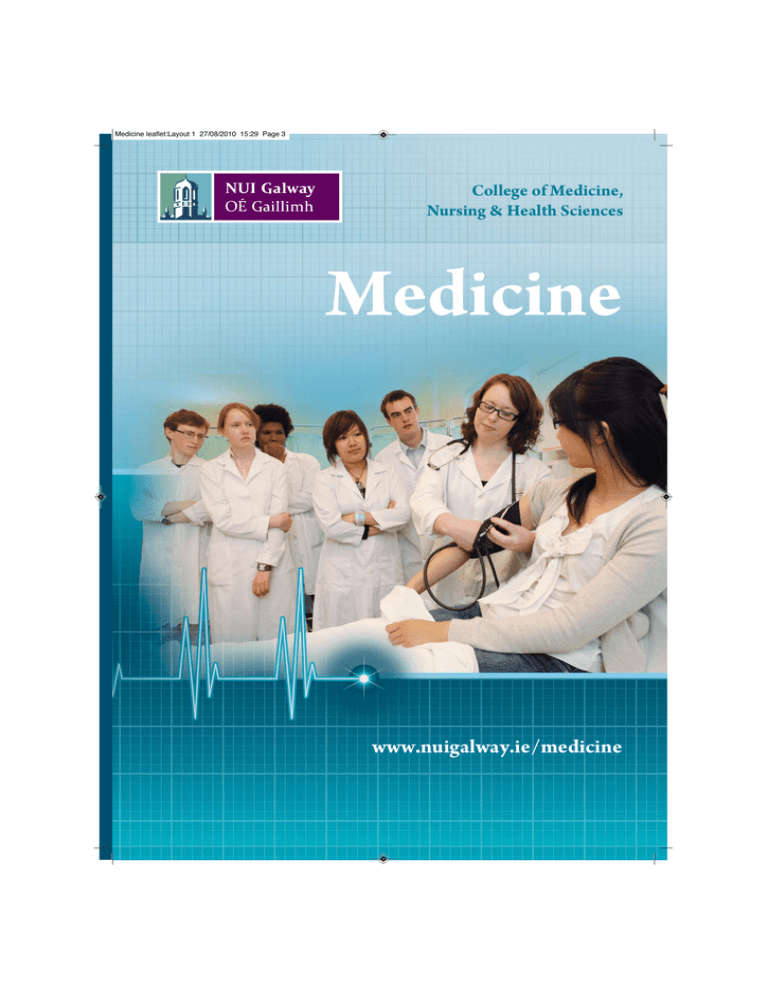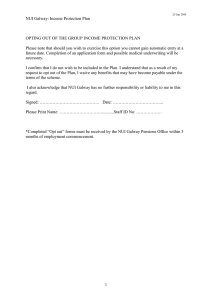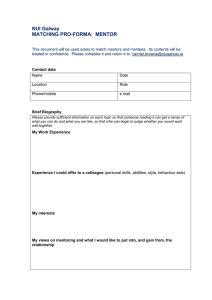Medicine www.nuigalway.ie/medicine College of Medicine, Nursing & Health Sciences
advertisement

Medicine leaflet:Layout 1 27/08/2010 15:29 Page 3 College of Medicine, Nursing & Health Sciences Medicine www.nuigalway.ie/medicine Medicine leaflet:Layout 1 27/08/2010 15:30 Page 4 Studying Medicine at NUI Galway The School of Medicine at NUI Galway offers a diverse and dynamic medical programme. Our integrated curriculum provides a unique learning environment and approach to Medicine that is centred on the systems of the healthy body, and the consequent treatments when these are affected by disease. The School is focused and dedicated to the education of caring and ethical, as well as highly competent, future doctors. Our Medical programme is highly integrated and modular. Our lecturers teach modules that connect up material from different disciplines giving you a holistic and fully integrated experience of all facets of Medicine and how they interrelate. Health care delivery is a team activity and good communication is a key skill for every doctor. We place a lot of emphasis on training you to be a good communicator, throughout the Medicine degree, and you will greatly value this training when you come to practice as a doctor. If you are a natural communicator, we can teach you to improve and if communication is difficult for you, we teach you how to overcome this. This approach to teaching is delivering very positive results for our medical students. Our students are now leading in national prizes and awards such as the Henry Hutchinson Stewart Scheme and the Health Research Board of Ireland, two prestigious awards that we have a great record of success in. Course Facts Bachelor of Medicine (MB) of Surgery (BCh) and of Obstetrics (BAO) CAO Code: GY501 Entry points (2009): Since 2010, undergraduate entry to medicine for school leavers is based on both: • achieving a minimum of 480 points and meeting the minimum subject entry requirements for the programme in the same sitting of the Irish Leaving Certificate Examination (or equivalent*) and • completing the required admissions test (HPAT-Ireland) within the 2 year period immediately preceding admission to the medicine programme Duration: 6 years or 5 years (if student has Physics, Chemistry and Biology) Average intake: 99 Entry requirements Minimum Grade HC3 in two subjects and passes in four other subjects at H or O level in the Leaving Certificate including: Irish, English, another language, Mathematics, a laboratory science subject i.e. Chemistry, Physics, Biology, Physics with Chemistry (joint) or Agricultural Science and any other subject recognised for entry purposes. Medicine (6 years) Medicine (5 years) In addition to the above requirements a minimum HC3 in two of Biology, Chemistry, Physics, Physics/Chemistry, and Agricultural Science is required. Additional requirements Students must satisfy the Garda Vetting and Medical Clearance requirements. Medicine leaflet:Layout 1 27/08/2010 15:30 Page 5 The HPAT Test The admissions test for Medicine is called HPAT-Ireland (Health Professions Admission Test Ireland). This test is independently administered by ACER (Australian Council for Educational Research). The HPAT-Ireland test measures a candidate’s logical reasoning and problem solving skills, as well as non-verbal reasoning and the ability to understand the thoughts, behaviour and/or intentions of people. The HPAT Test does not test subject knowledge and candidates do not require special understanding of any academic discipline. However, some familiarity with the question types typically presented in HPAT-Ireland would be an advantage - sample questions are available at www.hpat-ireland.acer.edu.au. Information on how to purchase further HPAT-Ireland Practice Materials is also available on the HPAT-Ireland website. The test results will complement the Leaving Certificate Examination assessment for selecting applicants for admission to an undergraduate Medical School programme. Foundation Year • Physics • Chemistry • Biology • Foundations of Medicine Year 1 • Anatomy • Biochemistry • Pharmacology • Physiology • Cardiovascular System • Gastro-intestinal System • Human Nutrition • Renal System • Respiratory System • Professionalism Year 2 Course Outline The Medicine programme combines theoretical learning and clinical practice. The modules you will study emphasise the basic and cognitive sciences, which provide a basis for understanding modern health care. Students also learn clinical and communication skills, as well as patient contact. The end of the programme is dedicated to the knowledge, skills and attitudes necessary for professional practice. As students gain experience, they assume greater responsibility and undertake clinical placement rotations in a network of affiliated hospitals and general practices in Galway and around the West of Ireland. • Central Nervous System • Endocrinology • Genetics • Molecular Medicine • Reproduction and Development • Drugs and Disease • Health and Disease • Organ Failure • Professionalism Did you know The School is currently expanding its Regional Medical Academies to include Sligo General Hospital, Letterkenny Hospital, Mayo Hospital, Castlebar and Portiuncula Hospital, Ballinasloe. Medicine leaflet:Layout 1 27/08/2010 15:30 Page 6 Year 3 • Forensic Medicine • Health and Disease • Global Health Development • Professionalism • Foundations of Clinical medicine • Cardiovascular Studies • Respiratory, Perioperative and Critical Care, • Gastrointestinal Studies • Care of the Elderly • Acute Hospital Care Year 4 • Psychiatry • Paediatrics • Obstetrics and Gynaecology • General Practice • ENT • SSM Year 5 Advanced Clinical Practice • Cardiovascular Studies • Gastrointestinal Studies • Respirator, Critical and Perioperative Care Medicine • General Medicine/Surgical Care Specialist Clinical Practice • Musculosketal Studies • Renal/Urology Studies • Neurology/Ophthalmology Studies • Dermatology/Plastics • Cancer Studies Shadowing for Clinical Practice Clinical Placement Students go on clinical placements from the second semester of year three of the Medical Programme. As our Regional Medical Academies expand, it is expected that students will complete a part of their clinical programme at an affiliated hospital in addition to Galway University Hopsital. This will provide students with a unique opportunity to train in some of the best hospitals in Ireland, in a variety of clinical settings. Medicine leaflet:Layout 1 27/08/2010 15:29 Page 1 Career Opportunities Work placement Graduates have the opportunity to work in: In partnership with Health Service Executive (HSE) West, the School of Medicine assists in an Intern Placement Scheme. The purpose of the scheme is to ensure that medical graduates receive the appropriate training and experience to become registered physicians. We work hard to ensure that as many graduates as possible obtain 12 months placement in recognised intern posts in our teaching and affiliated hospitals. • • • • • • • Hospitals Private Practice Education and Research Community Rehabilitation Services Pharmaceutical Companies Medical Device Manufacturers Health Insurance Companies Honours graduates can also pursue higher degrees in a wide range of related disciplines: • • • • • • • • • • • Doctor of Medicine, MD Master of Surgery, MCh Master of Obstetrics, MAO PhD Postgraduate Diploma and Master of Medical Science (Health Informatics) Postgraduate Diploma and Master of Medical Science (Endovascular Surgery) Master of Science in Sport and Exercise Physiotherapy Master of Science in Sport and Exercise Medicine Postgraduate Diploma and Master of Health Sciences Master of Science (Regenerative Medicine) Master of Science (Clinical Research) Did you know The School has an excellent record of student engagement and encouraging student volunteering. You will have the opportunity for summer work overseas in developing countries where your new skills in healthcare will be put to good use. Medicine leaflet:Layout 1 27/08/2010 15:29 Page 2 Michael McNamara Medical Student What our students say... “I’ve been studying medicine here for 3 years now and it has been quite the adventure! The Medical School is really wonderful. Along with all the usual nuts and bolts of talented and friendly lecturers and academic staff, I think what’s particularly unique about the School is the interaction between the different years in medicine... you know everyone and everyone knows you and most importantly, there’s always someone to ask. The atmosphere and buzz is really fantastic. The course content is well broken down and taught in an engaging and involving way. For example, in both the first and second years of study, students get to pick a special study module with options ranging from sports psychology to emergency medicine to complementary medicine. I chose to do one in high altitude medicine. It was actually fantastic! I think it’s for reasons like this that I love NUI Galway so much... we just have a way of getting things done in a more fun way here!” Did you know We offer a unique range of Student-Selected Modules (SSMs) in a wide range of topics ranging from Paramedic Skills to Medicine and the Arts. The range of Student - Selected Modules is constantly being developed and expanded. SSMs currently on offer in first and second year of the Medicine programme include: Adolescent Medicine Medical English Asylum and Refugee Healthcare Medical Humanities Basic Surgical Skills Medicine and the Arts Community CPR Teaching Pre-hospital Emergency Care End of Life Enhancement Presentation Skills Exercise Physiology Regenerative Medicine Head and Neck Anatomy Sign Language High Altitude Medicine Sports Psychology Homelessness Project Sports Science Research Learning to Teach Teanga an Leighis Malaysian Culture & Eastern Medicine Teenage Mental Health Promotion Medical Electronics Understanding Complementary Medicine School of Medicine, Clinical Science Institute, NUI Galway T +353 91 544 475 F +353 91 494 519 E medschool@nuigalway.ie www.nuigalway.ie/medicine


